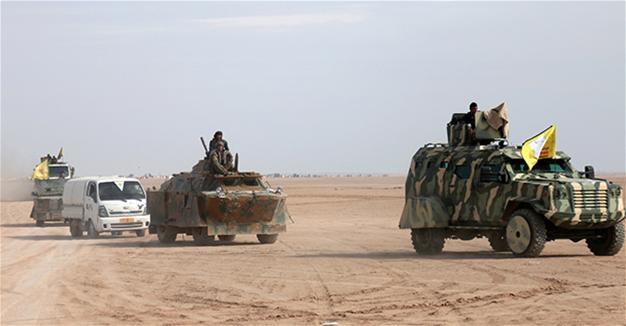US-backed fighters thrust into ISIL bastion Raqqa
HAZIMA / ANKARA

REUTERS photo
U.S.-backed forces launched a major move to take Raqqa, the headquarters of the Islamic State of Iraq and the Levant (ISIL) in Syria on June 6, with Ankara warning that it will retaliate immediately if the military operation poses a threat against Turkey.The attack on the northern city, which was seized by the jihadists in early 2014, has been seven months in the making and is backed by air support, military advisers and weapons deliveries from the U.S.-led coalition.
After months sealing off access routes to the city from the east, north and west, the U.S.-backed Syrian Democratic Forces (SDF) said it entered city limits for the first time on June 6.
“Our forces entered the city of Raqqa from the eastern district of Al-Meshleb,” SDF commander Rojda Felat told Agence France-Presse, adding that clashes were also raging on the city’s northern outskirts.
“They are fighting street battles inside Raqqa now, and we have experience in urban warfare,” she said.
The People’s Protection Units (YPG), seen as a terrorist organization by Ankara for its links to the outlawed Kurdistan Workers’ Party (PKK), constitutes the backbone of the U.S.-backed SDF.
Ankara has repeatedly said it would like to be a part of the Raqqa operation if the YPG is discarded but the U.S. has stuck with the Kurdish group in the field.
“We will not let any situation emerge that would pose risks for our country,” Turkish Prime Minister Binali Yıldırım said on June 6, addressing his party deputies in parliament.
“If we come across any situation in Raqqa or any spot in the region that threaten our security, we will give the necessary response,” he said.
The advance of the SDF was backed by heavy air strikes by the U.S.-led coalition, the Syrian Observatory for Human Rights stated.
The coalition, which also includes Turkey, began its air campaign against ISIL in Iraq in August 2014, expanding its operations to Syria the following month.
Defeating ISIL in Raqqa would “deliver a decisive blow to the idea of ISIS as a physical caliphate,” coalition commander Lieutenant General Steve Townsend said.
Warning the fight would be “long and difficult,” Townsend framed the offensive as part of a greater struggle against ISIL, which has claimed attacks in many countries including last month’s deadly bombing in Manchester.
“We all saw the heinous attack in Manchester,” he said.
The SDF launched its operation to take Raqqa - dubbed Wrath of the Euphrates - in November.
It then scored a series of victories in the wider province, including capturing the strategic town of Tabqa and its adjacent dam in May.
On June 6, SDF spokesman Talal Sello made the long-awaited announcement that the battle for Raqqa itself had begun.
“We declare today the start of the great battle to liberate the city of Raqa, the so-called capital of terrorism and terrorists,” Sello told reporters in the village of Hazima, north of the city.
The United Nations said it was concerned for the safety of more than 400,000 men, women and children in Raqqa province, who may be caught up in the violence.
As the SDF has drawn closer to the city, reports of civilian casualties in coalition air strikes have swelled.
An estimated 300,000 civilians were believed to have been living under ISIL rule in Raqa, including 80,000 displaced from other parts of the country, Agence France-Presse reported said.
Thousands have fled in recent months to other parts of the province or to makeshift camps in territory newly captured by the SDF. But there are risks for civilians who try to escape the last cities under jihadist rule.
On June 6, U.N. human rights chief Zeid Ra’ad Al Hussein accused ISIL of murdering dozens of civilians to prevent them from fleeing Mosul last week.
Raqqa has been the scene of some of ISIL’s worst atrocities, including gruesome executions, public displays of bodies and the trafficking of women.
It was one of the twin pivots of ISIL’s so-called “caliphate,” with Mosul in neighboring Iraq - where U.S.-backed forces are also bearing down on the jihadists.
















